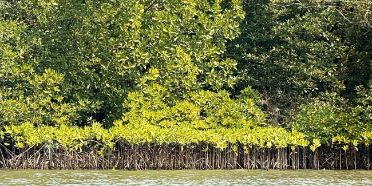Mangrove restoration towards sustainable coastal ecosystem management
The RESCuE-2 project aims to develop a science-based framework for restoring mangrove forests in the heavily populated South-East Asian coastal zones, where millions of people rely on mangroves for their livelihood.
Factsheet
- Schools involved School of Agricultural, Forest and Food Sciences
-
Institute(s)
Multifunctional Forest Management
HAFL Institut Hugo P. Cecchini - Research unit(s) Forest Policy and International Forest Management
- Funding organisation SNSF
- Duration (planned) 01.07.2023 - 01.05.2026
- Head of project Prof. Dr. Claude Garcia
-
Project staff
Prof. Dr. Claude Garcia
Patrick Olivier Waeber -
Partner
Technische Universität Dresden
Université Libre de Bruxelles
King Mongkut’s University of Technology Thonburi
CIRAD Forschungsinstitut Montpellier - Keywords Sustainable production systems;Society, policy and rural development;Climate change mitigation and adaptation;Forestry and landscape management;Forest Landscape Restoration;
Situation
Coastal zones in South-East Asia are home to a large proportion of the population living below the poverty line who heavily rely on fishery, aquaculture, and wood provided by mangrove forests for their livelihood. Despite being critical to climate change mitigation, coastal protection, and securing the food and livelihoods of millions of people, mangrove forests are under severe threat from the effects of climate change and human activities. Current restoration efforts are ineffective and costly. The project aims to address this gap by developing guidelines for effective mangrove restoration that can promote regional cooperation and capacity building among scientists, national policy makers, and local communities.
Course of action
By targeting biodiversity protection and mangrove restoration, the project will help mitigate the effects of climate change and secure clean water, sufficient food, and secure shelter for the local communities. The project will monitor the ecological impact of the restoration efforts, evaluate the potential success of alternative restoration measures, and support local and national decision- and policy-makers to implement effective protection and restoration actions.

